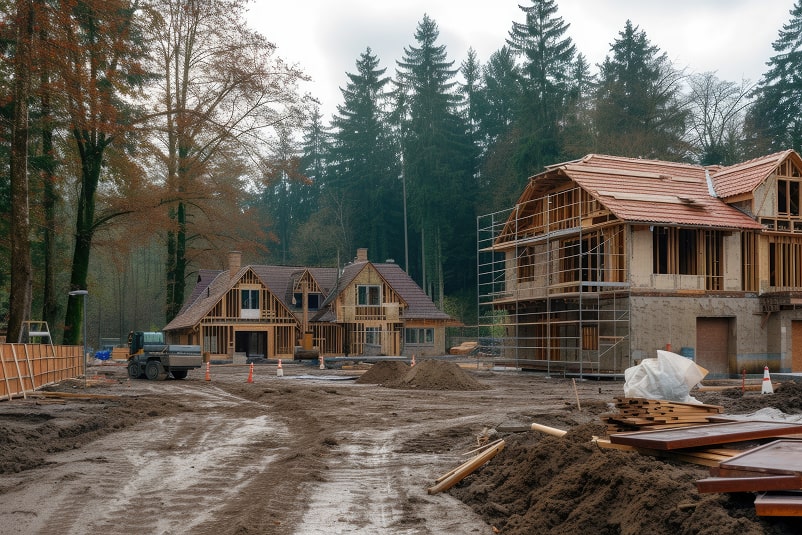Introduction to Semi-Commercial Mortgages
Mortgages for semi-commercial property are becoming an increasingly popular financing solution in the property market. These specialist loans are designed for mixed-use properties that include both residential and commercial elements such as a shop with a flat above, a pub with owner accommodation, or a dental surgery with a private residence attached.
The commercial element of these properties is specifically intended for business purposes, highlighting their dual function as spaces for both living and business activities.
If you’re a property investor looking to maximise returns, or a business owner aiming to live and work in the same building, a semi-commercial mortgage can provide the flexible finance you need. This article breaks down how these mortgages work, who they benefit, and what options are available from lenders.
What Is a Semi-Commercial Mortgage?
A semi-commercial mortgage is a type of finance used to purchase or refinance a property that has both commercial and residential use. Because of this dual function, these properties don’t qualify for standard residential mortgages and require more specialised lending.
Standard residential property is typically financed with a residential mortgage, but when a property includes both commercial and residential elements, such as in semi-commercial properties, a different approach is needed.
For example, you may be buying a building that includes a retail unit on the ground floor and a residential flat on the upper floors. The commercial portion might generate income through business rental, while the residential part is either let out or used as accommodation.
How Do Semi-Commercial Mortgages Work?
Lenders assess semi-commercial mortgages slightly differently to traditional residential or buy-to-let loans. Typically, borrowing is available up to 75% loan-to-value (LTV), although higher LTVs may be considered in exceptional cases or where additional security is provided.
The amount you can borrow generally starts at £25,000 and can stretch into the millions, depending on the property and the borrower’s profile. The loan amount you borrow can affect your eligibility, the lender arrangement fees, valuation fees, and the overall terms of your mortgage. Mortgage terms range from 5 to 30 years, with repayment options including capital and interest, interest-only, or a combination of both.
Interest rates tend to be higher than those for standard residential mortgages, usually starting from around 2.5% above the Bank of England base rate, although actual rates vary depending on the lender, the borrower’s credit profile, and the perceived risk of the commercial element.
Affordability assessments are based on rental income, projected income from the business, or the borrower’s personal income depending on whether the applicant is an investor or an owner-occupier.
Who Can Benefit from a Semi-Commercial Mortgage?
These mortgages cater to a diverse group of borrowers, offering tailored finance to suit various objectives.
Property investors find semi-commercial properties attractive due to their dual-income streams. With rental income from both the residential and commercial units, the yields are often higher than those achieved with a standard buy-to-let.
Rent from tenants in both parts of the property not only boosts overall yield but also provides added security for the investment, as consistent rent payments help mitigate risk for both investors and lenders. Additionally, investors benefit from a reduced stamp duty liability, mixed-use properties are not subject to the 3% stamp duty surcharge applied to second homes and buy-to-lets.
Business owners also stand to gain. If you’re running a shop, restaurant, or clinic and want to live above your premises, a semi-commercial mortgage enables you to combine your living and working environments under one roof. Owner-occupier mortgages are assessed either on your personal income or the profitability of your business.
Key Benefits of Semi-Commercial Mortgages
One of the biggest advantages of semi-commercial mortgages is the stronger rental yield they can deliver. With two distinct income sources commercial and residential, you’re less exposed to the risk of vacancies. If one unit becomes vacant, the other can still generate cash flow.
The stamp duty savings are another significant benefit. Since mixed-use properties fall under non-residential stamp duty rules, buyers often pay considerably less than they would for a purely residential buy-to-let investment.
Borrowers also enjoy flexibility in structuring their loans. Whether you’re seeking interest-only repayments to keep monthly outgoings low or prefer to reduce capital over time, there are options available to suit different strategies. Borrowers can choose how to repay the mortgage based on their financial goals, such as using rental income or business profits to meet repayment obligations.
Potential Drawbacks and Considerations
While semi-commercial mortgages offer excellent potential, they’re not without complications. Borrowers must account for higher upfront costs, including the arrangement fee (also known as the lender arrangement fee, typically 1–2% of the loan), valuation fees (which are more expensive due to the dual-use nature of the property), and legal fees (often higher because of the complexity of the transaction). The arrangement fee and other associated fees are usually paid towards the end of the mortgage process, so it’s important to be aware of when each fee is paid.
The valuation process itself is more involved. Lenders require a full commercial valuation, which assesses the property’s value by considering both the commercial and residential elements of the property. This can lead to increased delays and costs.
Additionally, lending criteria can be stricter. Many lenders prefer borrowers with previous property investment experience, strong credit history, or stable personal/business income. For first-time investors, this could limit your options.
Property Types and Eligibility
Semi-commercial mortgages are designed to finance a wide range of property types that blend both residential and commercial elements. Typical examples of semi-commercial property include buildings with retail spaces on the ground floor and living space above, offices with attached flats, or even pubs with owner accommodation.
To qualify for a semi-commercial mortgage, the property must have a clear commercial element such as a shop, office, or other business premises alongside a residential element.
Eligibility for a semi-commercial mortgage is determined by several factors. Lenders require that the commercial element generally makes up less than 50% of the total floor space, ensuring the property is truly mixed use. Applicants can include business owners, property investors, and limited liability partnerships, all of whom may be looking to expand their property portfolio or purchase a new investment.
When assessing eligibility, lenders require a minimum deposit, typically at least 25% of the property’s value. They will also review the applicant’s financial situation, including rental income from both the residential and commercial parts, business bank statements, and trading history.
The property’s type, location, and potential for generating income are all considered as part of the lender’s criteria. This thorough assessment helps ensure that the mortgage is suitable for both the property and the borrower’s circumstances.
Residential Part of the Property
The residential part of a semi-commercial property offers flexibility for both owners and investors. It can be occupied by the owner, providing convenient living space above or alongside a business, or it can be rented out to tenants for additional rental income.
If the owner chooses to live in the residential part, the semi-commercial mortgage may be classified as a regulated transaction. This can limit the number of lenders willing to offer finance, as regulated semi-commercial mortgages are subject to stricter rules and oversight.
Compared to standard residential mortgages, semi-commercial mortgages come with different lender criteria, higher interest rates, and additional fees. While residential mortgages are designed solely for properties used as homes, a semi-commercial mortgage is tailored for properties that combine residential and commercial elements.
For example, if you want to finance a shop with a flat above, a semi-commercial mortgage is the appropriate choice, offering the flexibility to use or let out the residential part as needed. This makes semi-commercial mortgages a versatile solution for those seeking to combine business and living arrangements within a single property.
Commercial Property Considerations
When applying for a semi-commercial mortgage, the commercial property aspect requires careful attention. Lenders will charge a valuation fee to assess the value of the property, taking into account the location, condition, and the potential for generating rental income from the commercial element.
The commercial part of the property must be used for legitimate commercial purposes, such as retail, office, or hospitality space, and its viability as a business premises will be closely scrutinised.
Lenders also consider the property’s potential for future development or renovation, which can impact both its value and its ability to generate income. Working with a commercial mortgage broker can be invaluable during the application process, as they can help you navigate lender requirements, compare commercial mortgage lenders, and secure the best deal for your semi-commercial mortgage.
A broker’s expertise can also help you understand the full range of fees involved, from valuation fees to arrangement fees, ensuring you are fully prepared for the costs and steps involved in securing finance for your commercial property.
Mixed Use Properties
Mixed use properties, including semi-commercial properties, present a compelling opportunity for property investors seeking to diversify their income streams. By combining residential and commercial elements such as apartments above retail spaces, these properties can deliver both steady rental income and the potential for long-term capital growth. Semi-commercial mortgage rates can vary depending on the lender, the specific property type, and your individual circumstances, so it’s important to shop around for the best deal.
Arranging a semi-commercial mortgage typically involves paying a broker fee, but the guidance and access to specialist lenders that a broker provides can be well worth the cost. For example, a broker can help you secure finance for a mixed use property that might otherwise fall outside the criteria of mainstream lenders.
Whether you’re investing in a building with both residential and commercial units or expanding your property portfolio, semi-commercial mortgages offer the flexibility and support needed to make the most of mixed use investments.
Mortgage Options Available
There are several different types of semi-commercial mortgages available, depending on your goals:
Investment Mortgages: Ideal for landlords and portfolio investors looking to let both the commercial and residential units. These mortgages rely heavily on rental income to determine affordability and typically offer up to 75% LTV.
Owner-Occupier Mortgages: Perfect for those who plan to live in the residential section while operating a business downstairs. Affordability is based on personal income or business profits.
Bridging Finance: A short-term solution for buying and renovating a semi-commercial property, especially useful if the property needs refurbishment before securing a long-term mortgage.
Adverse Credit Mortgages: Available from some specialist lenders, these mortgages cater to borrowers with less-than-perfect credit, though rates will be higher.
Cross-Charged Loans: Useful for borrowers with equity in another property. These loans can increase available LTV or even fund 100% of the purchase using existing assets.
To get a semi commercial mortgage, you’ll need to meet the lender’s eligibility criteria, provide a suitable deposit (often 25% or more), and submit a formal application with supporting documents. Both individuals and companies can apply, depending on the lender’s requirements.
Residential Mortgages vs Semi-Commercial Mortgages
When comparing residential mortgages to semi-commercial mortgages, several key differences stand out. Residential mortgages are generally reserved for properties used exclusively as homes, and they typically offer lower interest rates and fees.
However, they are not suitable for properties with a commercial element, such as a shop with a flat above. In these cases, a semi-commercial mortgage is required, offering the flexibility to finance properties that combine residential and commercial uses.
Semi-commercial mortgages usually come with higher interest rates, lender arrangement fees, and valuation fees, reflecting the added complexity and risk for lenders. Lender criteria for semi-commercial mortgages are also more stringent, with affordability calculations often based on both rental income and the applicant’s financial situation.
When deciding between a standard residential mortgage and a semi-commercial mortgage, it’s essential to consider the property’s intended use, your own circumstances, and the full range of costs involved. Consulting with a mortgage broker can help you navigate these choices and ensure you secure the most suitable mortgage for your needs.
Lenders Offering Semi-Commercial Mortgages
High Street and Challenger Banks
Lender | Description |
|---|---|
Barclays | Offers semi-commercial finance via brokers. |
HSBC | Provides mixed-use property finance for SMEs. |
NatWest | Known to support business property lending. |
Lloyds | Offers commercial lending for small businesses. |
Santander | Accepts applications through intermediaries. |
TSB | Increasing focus on small business lending. |
Metro Bank | Offers specialist mortgages for mixed-use. |
Specialist Lenders
Lender | Description |
|---|---|
Aldermore Bank | Offers tailored solutions for investors and SPVs. |
Shawbrook Bank | Flexible terms with no property count limit. |
Cambridge & Counties | Commercial lender with strong mixed-use expertise. |
Together Money | Supports non-standard applicants and adverse credit. |
LendInvest | Offers fast digital semi-commercial loans. |
Octopus Real Estate | Specialist finance for complex property deals. |
Cumberland Building Society | Experienced in hospitality and mixed-use lending. |
Cynergy Bank | Offers owner-occupier and investment mortgages. |
Clydesdale Bank | Competitive options for small businesses. |
Costs Involved
Before applying for a semi-commercial mortgage, it’s important to factor in all associated costs. These include:
Arrangement fees, usually between 1–2% of the loan.
Valuation fees, which are higher than residential-only properties due to the complexity of assessing both parts.
Legal fees, often more expensive and may involve separate solicitors for the commercial and residential aspects.
Broker fees, depending on the level of service and access to lenders.
Early repayment charges (ERCs), which apply if the mortgage is repaid early during the fixed period.
Whether semi commercial mortgages are regulated depends on the proportion of residential property involved. If more than 40% of the property is residential, the mortgage is classed as regulated, which can affect the costs and lending criteria compared to unregulated options. Working with a broker can help you compare available products and secure the best possible deal on your semi-commercial mortgage.
Current Market Outlook
The semi-commercial mortgage market continues to expand. As investors seek higher yields and greater portfolio diversification, mixed-use properties are becoming increasingly attractive. Strong demand for renting both commercial and residential units is also driving growth in the semi-commercial mortgage market, as rental income from tenants can help support mortgage payments.
Lenders have responded by broadening their semi-commercial offerings, and the market now includes a healthy mix of high street banks, challenger institutions, and niche providers.
Additionally, with regulatory changes on the horizon and more lenders embracing specialist finance, semi-commercial mortgages are likely to become even more accessible in the near future.
Final Thoughts
A semi-commercial mortgage can be a smart, flexible way to finance mixed-use property. Whether you’re an investor looking to boost yields or a business owner wanting to integrate work and living space, this type of mortgage offers excellent potential.
However, it’s not a one-size-fits-all product. The application process is more complex, and the cost can be higher than standard mortgages. That’s why working with a broker who understands the semi-commercial mortgage market can help you access the most competitive deals and navigate lender requirements with ease.
Get help from an experienced mortgage broker
You can speak to one of our specialist mortgage brokers who would be able to guide you through the process. They will advise if there is a lender available and the maximum loan amount based on your circumstances. We are a whole of market mortgage brokerage with access to all lenders. Call us on 01332 470400 or complete the form with your details for us to give you a call back.
Why Work with Option Finance for Commercial Mortgages?
At Option Finance, we specialise in mortgages for complex credit scenarios. Our team works with all major bad credit lenders and has access to exclusive deals that aren’t available on the high street.
Understanding one’s credit report from a credit reference agency can help in securing a mortgage.
Over 20 years of experience
Full market access to specialist lenders
Fast, honest, and personalised mortgage advice
Expert help with complex or recent credit issues
Showing our favourite reviews

Always attentive, helpful and efficient
Jonathan, 27 Jan 2025

Best Mortgage Broker in the UK!
Liam, 26 Nov 2024

Ben was really helpful in helping me…
George, 28 Aug 2024
FAQs
What is a semi-commercial mortgage?
A semi-commercial mortgage is a loan used to purchase or refinance a property that has both residential and commercial elements, such as a shop with a flat above.
Who can apply for a semi-commercial mortgage?
Both individuals and limited companies can apply. They’re commonly used by landlords, investors, or business owners who plan to occupy the commercial space and rent out the residential part.
How much deposit do I need for a semi-commercial mortgage?
Typically, lenders require a 25% to 35% deposit. The exact amount may vary depending on your credit history, income, and the type of property.
Are interest rates higher for semi-commercial mortgages?
Interest rates are usually slightly higher than standard residential mortgages but often lower than full commercial mortgage rates, as the residential element reduces risk for lenders.
What types of properties qualify for a semi-commercial mortgage?
Common examples include retail units with flats above, takeaways with living accommodation, or offices with attached apartments as long as the property has a clear mix of commercial and residential use.
Ready to Take the First Step?
Whether you’re a first-time buyer, remortgaging, or moving home, bad credit doesn’t have to hold you back.
Understanding credit scoring can help you prepare for a mortgage application. You can speak to one of our specialist mortgage brokers who would be able to guide you through the process. They will advise if there is a lender available and the maximum loan amount based on your circumstances. We are a whole of market mortgage brokerage with access to all lenders.
































